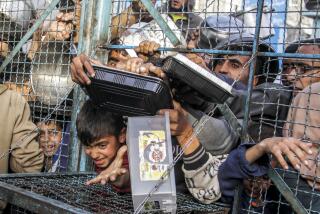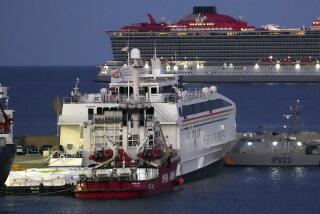Besieged City Gets Planeload of Food, Medicine : Bosnia: It is the first humanitarian aid Tuzla has seen since the Serbian rebel blockade began two years ago. Spirits are lifted.
- Share via
TUZLA, Bosnia-Herzegovina — A single U.N. plane carrying food and medicine broke through rain clouds and a Serbian rebel blockade Tuesday to launch a humanitarian airlift to this crowded city, which has evaded shelling and “ethnic cleansing” only to become a magnet for the homeless, hungry and maimed.
The first flight into Tuzla’s airport since the Serbian insurgency began two years ago lifted spirits among the dejected people here who have watched their multicultural city crumble into embittered factions as half a million Muslim refugees flooded in.
“We have nothing. We’ve been starved by the aggressors, and our city has been ruined,” complained Azra Nisic, a wizened 41-year-old who blames the international community for leaving Tuzla so long at the mercy of the Serbian blockade. “But maybe God is helping us now; maybe we will finally get enough to eat.”
Only 22 tons of wheat flour, medicine and school supplies accompanied the U.N. officials ferried in by the first flight to Tuzla for a day of inaugural fanfare.
That first delivery also might be the last for weeks to come.
Bickering over the number and nationality of U.N. troops needed to inspect incoming cargo has blocked an agreement between Serbian rebels and Muslim-led government forces to allow daily flights by the Office of the U.N. High Commissioner for Refugees; the Tuzla shipments are to be like those that have kept Sarajevo from starving during two years of blockade and bombardment.
But Serbs contend that the U.N.-operated airport, which is in government-held territory, could become a conduit for weapons smuggling. They have insisted that Russian members of the U.N. Protection Force be posted at the airport, which is within Serbian artillery range. Serbs see the Russians as allies, which prompts the government to object.
For the time being, said Yasushi Akashi, civilian head of the U.N. mission, only military flights to resupply 1,000 Scandinavian peacekeepers deployed to the Tuzla area will be allowed to land at the airport. Akashi said he hopes humanitarian aid flights can begin within a few days and “certainly within three weeks.”
The limited achievement of opening the airport only for U.N. military use reflected the two-steps-forward, one-step-back nature of recent peace efforts in the Balkans.
A cease-fire has held in Sarajevo for six weeks, and Muslims and Croats have reconciled after a year of deadly fighting over what land was left after Serbs conquered 70% of Bosnia. Yet war dangers still plague most of the country, and prospects for a negotiated settlement seem as distant as ever.
The search for peace in Bosnia inevitably leads to the suspended conflict in Croatia, where Serbian rebels grabbed one-third of the country in 1991 and proclaimed their own state, the Republic of Serbian Krajina. Nationalists in Belgrade, the Serbian capital, want to link Krajina and Serb-occupied areas of Bosnia into a Greater Serbia.
Russian-mediated talks in the Croatian capital, Zagreb, between Krajina rebels and Croatian government officials got under way with the aim of drafting a final settlement of the conflict frozen by the U.N. deployment in early 1992. But the sides remain polarized, with the rebels insisting on independence and the Croatian leadership refusing to consider anything other than full sovereignty over Krajina.
John Mills, an aide to mediators at the first Serb-Croat talks aimed at a peace treaty, described the opening session as “detailed and purposeful” but reported no progress.
Signs of tension also arose in Bosnia, with Serbs resuming efforts to block humanitarian aid to the Muslim enclave of Maglaj and ignoring demands by U.N. officials to remove a cache of tanks and guns discovered near Sarajevo, in violation of a NATO deadline for withdrawal of all artillery around the capital.
Officials of the Office of the U.N. High Commissioner for Refugees, which supplies Bosnia’s nearly 3 million needy, further deflated the significance of the Tuzla airlift by noting that a genuine breakthrough for peace would be restoration of trade and transport.
“Humanitarian aid is not the solution; let’s not fool ourselves,” said Manoel de Almeida e Silva, spokesman for the aid agency. “What is needed is for the situation to return to normalcy, and one element of that is the resumption of commercial traffic.”
Since Serbian nationalists rebelled against Bosnia’s proclaimed independence from Yugoslavia, the country has been carved up by the warring factions and studded with roadblocks.
U.N. officials said months ago that opening an air corridor to Tuzla was vital to ensure that aid got through to the region’s 800,000 people, more than half of whom are dependent on foreign handouts. Threatened NATO air strikes and diplomatic pressure from Russia compelled Bosnian Serb leader Radovan Karadzic to agree to the airlift.
Tuzla was getting as little as 12% of the aid targeted for the region late last year because of Serbian barricades on some convoy routes and because Muslim-Croat fighting blocked others.
With the Muslims and Croats now reconciled and some Serbian factions relenting amid the better atmosphere generated by the string of successful cease-fires, at least 45% of the needed food is expected to reach Tuzla this month, said Robyn Ziebert, the U.N. aid agency’s Tuzla representative.
Akashi presented Tuzla Mayor Selim Beslagic with a box of vegetable seeds as a symbolic gift, saying he hoped “like these seeds, the seeds of peace and hope will keep growing in this city and the whole country.”
“These dark days are almost over,” Akashi told Tuzla and Sarajevo officials assembled on the airport tarmac in driving rain.
He toured Tuzla’s main hospital and a refugee reception center during his five-hour visit, praising the ethnically mixed city for its “indomitable spirit” amid conditions he described as subhuman. “It will take some time, but already positive change is in the air and we will capitalize on that,” Akashi promised.
Times special correspondent Danica Kirka in Zagreb contributed to this report.
More to Read
Sign up for Essential California
The most important California stories and recommendations in your inbox every morning.
You may occasionally receive promotional content from the Los Angeles Times.














